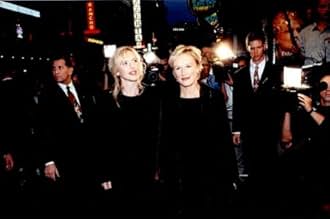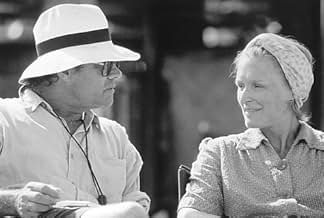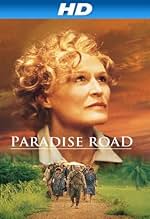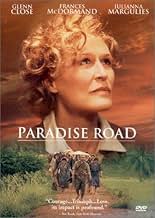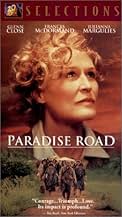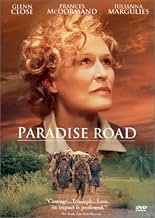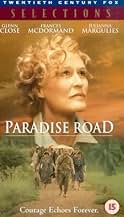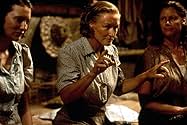IMDb RATING
6.8/10
6.2K
YOUR RATING
A group of women who are imprisoned on the island of Sumatra by the Japanese during World War II use music to relieve their misery.A group of women who are imprisoned on the island of Sumatra by the Japanese during World War II use music to relieve their misery.A group of women who are imprisoned on the island of Sumatra by the Japanese during World War II use music to relieve their misery.
- Awards
- 1 win & 7 nominations total
Johanna ter Steege
- Sister Wilhelminia
- (as Johanna Ter Steege)
Featured reviews
'Paradise Road' is not the first time the story of European and Australian prisoners of the Japanese during WW2 has been told - there is a famous old movie of Neville Shute's 'A Town Like Alice' and the BBC's wonderful tv series, 'Tenko', from the early 1980s. Nevertheless there is certainly scope for this film, which tells the story of a group of largely upper class women who have to come to terms with captivity and brutality as a 'defeated race' and somehow survive the war. The particular twist to this film is the fact-based story of the choir a group of women started in one camp. In other ways, however, the story is practically identical to 'Tenko', only crammed into around 2 hours instead of 30. This means that the effect is very much like watching one of those Reduced Shakespeare Company shows that do the Complete Works of Shakespeare in one performance. Virtually nothing happens in Paradise Road that doesn't happen in Tenko - fair enough, since it is fact based, but you feel like you're watching whole episodes crammed into a single line and you find yourself desperate for more character development - you never find out, for example, who Glenn Close's character really _is_. Despite this, the acting is top-hole and the script-writing is quite sparky, while production values are for the most part extremely high - this is a very good looking film. And therein lies a problem. While the violence is not sanitised, the starvation is. The women in this film appear to have suffered no more ill effects after 3 years of captivity and hard labour than a healthy sun tan and fetching urchin-style crop. The fight-in-the-shower scene shows us an array of perfect bodies with no sores, sunburn, bruises, skin diseases etc. (Again, Tenko did this much better.) When some of the women are meant to be dying of starvation towards the end the idea that these healthy women are meant to be suffering is so laughable as to be more like amateur dramatics than professional movie making. In failing to give a sense of the struggle to survive that the real women went through, this film diminishes their courage and does not do them justice.
This film is watchable, however, and tells stories that need to be told. Watch it by all means - but 'Tenko' is now out on video, so get that next!
This film is watchable, however, and tells stories that need to be told. Watch it by all means - but 'Tenko' is now out on video, so get that next!
The film was both moving and heart warming. It shows the unbelievable story of a group of women surviving a PoW camp against all the odds. I found it hard to believe that anyone was made to live in the conditions they were put in and live to tell the story. The acting was excellent and i don't think this film has got the praise it deserves. It is made even more moving by the fact it is based on a true story.
The film is based on actual true events and was inspired by the reminisces of the actual women prisoners of war, many of whom became life-long friends after the ordeal. Fact-based recounting of a group of women who are imprisoned on the island of Sumatra by the Japanese during World War II and used music as a relief to their misery .During WWII a group of women are captured by the Japanese and struggle to survive in brutal POW camp in the Far East . Their confinement is recounted in unsparing and harrowing detail , as Irish/British/Dutch/Jew women find themselves interned for the long duration . As orders from Nipponese Army Administration are strict as ¨Men and women will be imprisoned separately ¨ . ¨To avoid punishments and beatings , the ladies should presume themselves to endeavor , with passive behavior not negative¨. It is an internment camp, where civilians are kept for no other reason than being of the wrong nationality , this happened, for instance, to Japanese civilians in the U.S. Meanwhile, Adrienne suffering a surreal and brutal experience ; she is cruelly attacked ; however , she attempts to lift the spirits of the inmates and the brutalized women. Later on , she creates a choir , but the film refers to the singing prisoner of war women as a vocal orchestra rather than as a choir . This P.O.W film centers women prisoners as its principal cast and subjects with a theme of utilizing music to survive the horrors of war . The final credits state that the vocal orchestra performed over thirty works in the P.O.W camp . It discontinued performing though when about half of the members had died and the remaining survivors were not well enough to participate. The real-life first concert held by the women in the actual P.O.W camp was held on 27 December 1943 and the vocal orchestra performed over thirty works in the P.O.W camp during 1943 and 1944.
¨Paradise road¨(1997) is a good film set in Singapur , directed by Bruce Beresford with an all- woman star-cast as Glenn Close as Adrienne Pargiter , Julianna Margulies as Topsy Merritt , Frances McDormand as a Jew doctor , Cate Blanchett as Susan Macarthy and Jennifer Ehle as Rosemary Leighton-Jones . And special mention to Clyde Kusatsu as cruel , brutal Sergeant Tomiashi, 'The Snake' . Interesting and strong drama , being perfectly adapted by the same director Bruce Beresford , David Giles (story) and Martin Meader (writing credits) , also producers . The film is based on the diaries, reminisces and testimonies of Helen Colijn and Betty Jeffrey as described in their books, "Song of Survival" and "White Coolies". No weakest in the cast and few in the movie , which presents the women's Japanese captors as human and inhuman at the same time with clashing cultures included . Clearly there's much longer plot in this, but director Bruce Beresford concentrates on the passionate acting of Glenn Close . It's a taut psychological drama about physical and emotional survival focusing on the tensions between Glenn Close, soldiers and camp commander well played by Stan Egi as cultured officer. Crammed with emotive moments , the picture has a string of committed performances from Glenn Close Pauline Collins , Jennifer Ehle , among others . Familiar ground is trod in this prisoner-of-war saga , but the thought-provoking story and magnificent acting help sustain interest. Colorful cinematography filmed on location in Marrickville, Sydney, New South Wales, Australia ,Penang ,Malaysia ,Port Douglas, Queensland, Raffles Hotel Singapore . Sensitive musical score , the music in the film was derived from the actual score transcripts used in the P.O.W camps which survived World War II. This superior though overlooked drama , is also laudable for a fairly portrayal of the enemy captors and being rightly directed by Bruce Beresford , this is the second war movie he directed , his first was Breaker Morant.
Other films about women on concentration camps mistreated by Japanese military during WWII are the following : ¨Three came home¨1950 by Jean Negulesco with Claudette Cobert , Patrick Knowles , and Sussue Hayakawa ¨Women on valor¨(1986) by Buzz Kulik with Susan Sarandon , Kristy McNichol and Alberta Watson set in Philippines .
¨Paradise road¨(1997) is a good film set in Singapur , directed by Bruce Beresford with an all- woman star-cast as Glenn Close as Adrienne Pargiter , Julianna Margulies as Topsy Merritt , Frances McDormand as a Jew doctor , Cate Blanchett as Susan Macarthy and Jennifer Ehle as Rosemary Leighton-Jones . And special mention to Clyde Kusatsu as cruel , brutal Sergeant Tomiashi, 'The Snake' . Interesting and strong drama , being perfectly adapted by the same director Bruce Beresford , David Giles (story) and Martin Meader (writing credits) , also producers . The film is based on the diaries, reminisces and testimonies of Helen Colijn and Betty Jeffrey as described in their books, "Song of Survival" and "White Coolies". No weakest in the cast and few in the movie , which presents the women's Japanese captors as human and inhuman at the same time with clashing cultures included . Clearly there's much longer plot in this, but director Bruce Beresford concentrates on the passionate acting of Glenn Close . It's a taut psychological drama about physical and emotional survival focusing on the tensions between Glenn Close, soldiers and camp commander well played by Stan Egi as cultured officer. Crammed with emotive moments , the picture has a string of committed performances from Glenn Close Pauline Collins , Jennifer Ehle , among others . Familiar ground is trod in this prisoner-of-war saga , but the thought-provoking story and magnificent acting help sustain interest. Colorful cinematography filmed on location in Marrickville, Sydney, New South Wales, Australia ,Penang ,Malaysia ,Port Douglas, Queensland, Raffles Hotel Singapore . Sensitive musical score , the music in the film was derived from the actual score transcripts used in the P.O.W camps which survived World War II. This superior though overlooked drama , is also laudable for a fairly portrayal of the enemy captors and being rightly directed by Bruce Beresford , this is the second war movie he directed , his first was Breaker Morant.
Other films about women on concentration camps mistreated by Japanese military during WWII are the following : ¨Three came home¨1950 by Jean Negulesco with Claudette Cobert , Patrick Knowles , and Sussue Hayakawa ¨Women on valor¨(1986) by Buzz Kulik with Susan Sarandon , Kristy McNichol and Alberta Watson set in Philippines .
First class work here. The film follows a group of women captured in Asia by the Japanese, and interned as enemy aliens. It shows the inhuman brutality that the Japanese inflicted on anyone they considered to be of an inferior race. (i.e. not Japanese) (for that matter anyone not samurai) As a coping mechanism, and partially in defiance of their captors, the women form a vocal orchestra, playing the parts of classical music with only their voices. The music soothes the women, those in the orchestra, and those who aren't. The Japanese soldiers even come to enjoy the sound, and the atrocity rate drops a couple of notches.
Stand out performances abound here. In fact I can't really single out any of the cast. They were all good, including the Japanese actors. I had thought from the reviews that the music would be the largest part of the film, with just the backdrop of the prison camp, but it really wasn't. I recommend this film.
Stand out performances abound here. In fact I can't really single out any of the cast. They were all good, including the Japanese actors. I had thought from the reviews that the music would be the largest part of the film, with just the backdrop of the prison camp, but it really wasn't. I recommend this film.
I found this a very moving film about a group of fairly ordinary people placed in extraordinary conditions. I found myself quite involved with all the acting and the story line. Here is a film filled with outstanding and understated performances about people's ideals and courage being tested.
As to this story having been told in 2 or 3 other movies, I find that to be an incredible comment. I didn't see anyone saying that there had already been about 100 movies about men fighting in World War II when "Saving Private Ryan" came out. It is time that the stories of these extraordinary women be told. Soldiers aren't the only ones to suffer and die in wars.
As to this story having been told in 2 or 3 other movies, I find that to be an incredible comment. I didn't see anyone saying that there had already been about 100 movies about men fighting in World War II when "Saving Private Ryan" came out. It is time that the stories of these extraordinary women be told. Soldiers aren't the only ones to suffer and die in wars.
Did you know
- TriviaThe music in the film was derived from the actual score transcripts used in the P.O.W camps which survived World War II.
- GoofsThe women of the choir did the singing while sitting down because of having to work in the extreme heat during the day left them exhausted.
- Quotes
Adrienne Pargiter: You don't hate them do you?
Margaret Drummond: No.
Adrienne Pargiter: Why not?
Margaret Drummond: I've tried, but I can't bring myself to hate people. The worse they behave, the sorrier I feel for them.
- SoundtracksSymphony No. 9 in E minor Op. 95 'From the New World' II. Largo
Written by Antonín Dvorák (as Antonin Dvorak)
- How long is Paradise Road?Powered by Alexa
Details
Box office
- Budget
- $16,000,000 (estimated)
- Gross US & Canada
- $2,007,100
- Opening weekend US & Canada
- $62,518
- Apr 13, 1997
- Gross worldwide
- $2,007,100
- Runtime2 hours 2 minutes
- Color
- Sound mix
- Aspect ratio
- 2.35 : 1
Contribute to this page
Suggest an edit or add missing content



